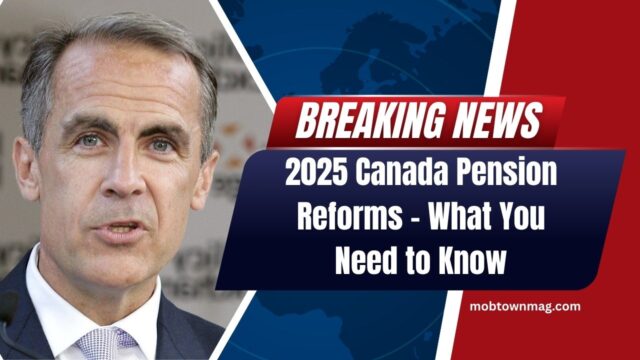As Canada moves through 2025, the debate on the retirement age has once again come to the forefront of public discussions. Amid rising financial pressures on both retirees and the Canadian government, the conversation around the pension withdrawal policy has intensified.
Many Canadians are questioning the fairness and sustainability of the existing retirement rules, especially for those nearing or already past the age of 60.
The retirement age debate is being fueled by inflation, longer life expectancy, and an increasing reliance on the Canada Pension Plan (CPP).
While some argue for a more flexible system to support today’s aging population, others caution against making drastic changes that might strain public funds.
What’s Fueling the Retirement Age Debate in Canada?
The debate surrounding Canada’s retirement age is driven by several key factors, which include:
1. Demographic Pressure
Over 20% of Canadians will be over 65 by 2030. This shift places a considerable burden on the country’s pension systems.
2. Longevity Trends
As life expectancy increases, Canadians are living longer, which means more people will rely on pension benefits for extended periods.
3. Inflation & Cost of Living
Many seniors find it challenging to retire at 65 because of the rising cost of living and inflation, leading some to work well beyond the official retirement age.
4. CPP & OAS Sustainability
There are growing concerns about the sustainability of the Canada Pension Plan (CPP) and Old Age Security (OAS) programs. As more people rely on these benefits, the pressure on the government to ensure their viability has increased.
Proposals in 2025
In response to these pressures, several proposals have been put forward to modernize the retirement framework in Canada. These proposals aim to ensure a more sustainable and fair retirement system.
Here are some key proposals being reviewed by the federal and provincial governments:
1. Gradually Raising the Retirement Age
There is a proposal to raise the official retirement age from 65 to 67 by 2030. This change would affect Canadians currently under the age of 60.
2. Partial Pension Withdrawals from Age 60
The government is considering allowing partial pension withdrawals from the age of 60, but with more flexible work options for those who wish to continue working.
3. Enhanced CPP Contributions for High-Income Earners
Another proposal suggests that high-income earners should contribute more to the Canada Pension Plan to ease the strain on the program.
4. Automatic Pension Deferral Incentives
The government is also considering automatic pension deferral incentives, which would encourage Canadians to delay their pension withdrawals for higher future payouts.
5. Tax Credits for Working Seniors
To support seniors who choose to work beyond the age of 65, the government is considering offering tax credits to help reduce their tax burden.
These proposals are currently under review as part of broader pension withdrawal policy updates for 2025.
How Will It Affect Seniors in Canada?
If these proposals are implemented, the impact on Canadian seniors will vary depending on their age and financial situation:
For Those Aged 60-64:
These individuals may have to wait longer for full pension access, possibly pushing retirement later than expected.
For Current Retirees:
There will be no immediate changes for current retirees, though future benefits may be adjusted based on the evolving pension framework.
For New Entrants to the Workforce:
New employees will likely face a higher retirement age and increased contribution requirements as they enter the workforce.
However, many seniors, particularly those in lower-income brackets or those with physically demanding jobs, have raised concerns that these changes will disproportionately impact them.
Proposed Retirement Policy Updates in Canada – 2025
| Policy Proposal | Current Status | Proposed Change | Impacted Group |
|---|---|---|---|
| Retirement Age | 65 | Gradually raised to 67 by 2030 | All workers under 60 |
| Partial Pension Withdrawal | Available at age 60 | Flexible withdrawal options with work | Early retirees |
| CPP Contribution for High-Income Earners | Standard rate | Increased contribution rates | High earners |
| Pension Deferral Bonuses | Optional | Increased deferral incentives | Seniors retiring late |
| Tax Credits for Working Seniors | Limited | Expanded credits | Workers aged 65+ |
Public Reactions and Political Support
The retirement age debate has become a hot political issue in Canada. Several political parties support the proposed increases, while others argue against delaying access to pensions.
The Canadian Association of Retired Persons (CARP) has expressed concerns, urging policymakers to avoid punishing seniors already struggling with financial hardship.
While urban residents with professional careers may be more open to a later retirement, rural and blue-collar workers, who are more likely to have physically demanding jobs, strongly oppose any increase in the retirement age.
As economic pressures continue to mount, the Canada retirement age debate will only grow more intense.
While the proposed pension withdrawal policy updates for 2025 aim to modernize the system, Canadians should prepare for potential changes.
The government is under increasing pressure to ensure that any reforms strike a balance between retirement security and public system sustainability.
For now, Canadians are encouraged to stay informed and plan for any shifts in the way pensions will be accessed in the future.
FAQs
What is the current retirement age in Canada?
The standard retirement age in Canada is 65, though some benefits are available from age 60 with reduced payments.
Are there changes to CPP in 2025?
While no official changes are in effect yet, the government is considering several updates to the Canada Pension Plan (CPP) as part of broader retirement reforms.
Will seniors already receiving pensions be affected?
No immediate changes are expected for current pensioners, though future benefits and eligibility may be adjusted.




